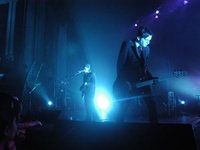Darkness. Silence. Suddenly a blinding array of bright blue lights blast the eager crowd into “Next Exit.” Smooth chords on the keyboard entice lead singer Paul Banks to inform the audience of their new fate: “We ain’t going to the town, we’re going to the city.”
The lights cool down to orange, then green, then purple, changing rhythmically as they gauge the emotive beats of the stoic musicians on stage. Last Wednesday night, within a matter of moments, the gracefully decadent Orpheum Theatre was transformed into the morose “city” of Interpol.
Instead of living in the shadow of their early fame, the four hip New Yorkers have brightened the paradoxically dark synthesized instrumental beats and cryptic lyrics of Turn On The Bright Lights. This evolution became tangible in concert as they progressed backwards, from new album to old, slowly speckling in songs from Bright Lights as Antics faded into the distance.
But who are Interpol? Who were those shadowy figures that occupied the stage dressed to attend their daily confrontation with fame? A cool breeze of class emanated from their sophisticated lyrics and brilliant sound composition as they posed in the shadows of their spotlights.
Opting to shine the multicolored lights out at the audience from behind the stage, Interpol has created an image of the unattainable. Only their lyrics and powerful beats remain palpable in this atmosphere, while their bodies become dark muddled masses mirroring their synthesized tones.
With a killer combo of drums, vocals, keyboard, guitar, and an undeniable bass, Interpol’s sound is an ironic medley of grim beauty. This “post-punk” band used a wide range of pitches and beats, a powerful bass line, vicious vocals, and periodic spurts of guitar cacophony to tempt its Boston audience.
But this musical recipe was almost spoiled in the first few songs with undulating vocals in “Next Exit” and the raucous “Slow Hands.” Their integrity was maintained, however, by the gritty nature of their music, which disguised much of the periodic feedback.
Overall their lyrics remained clear, allowing Banks’ voice to
vade the listener’s mind. The seat-restrained crowd went especially wild echoing the crisp vocals of “Evil,” their popular latest single, as they were drowned in a potent drum-and-bass beat.
Their nervous electric vibration in the last guitar chords of “Public Pervert” were strung out in a long sonorous cacophony that bled into blinding white lights and the hard drum pulse of “Not Even Jail,” both songs blasting out of the new album.
Mid-show, the guitarists began to strum their old classic, “NYC.” The slow fusion of deep guitar chords and light keyboard tones melted into mellow vocals and suddenly the New York City nightlife manifested itself in the conservative Boston venue—two large disco balls appeared in the back of the stage, turning the entire theater into a tranquil disco club.
It was only the chorus that removed the audience from their atmospheric trance, reminding them of Interpol’s role in this whole affair: “It’s up to me now, turn on the bright lights.”
Rocking the stage in formal suits, ties, vests, (and one beanie) Interpol sleekly managed to attain the impossible: a calm vibe in a sparkling atmosphere. Basking in the shade of their backstage multicolor spotlights Paul Banks’ rich voice became a static shadow glued to center stage, Sam Fogarino’s brilliant percussion a shimmer of cymbals, and Carlos D.’s bass a rock of rhythm.
Daniel Kessler remained the only shadow dancing in the musical darkness—body pulsing with each stroke on his guitar as he meandered around the stage.
But when the musicians eventually abandoned the stage, an awkwardly long encore followed. The audience became restless, screaming out their favorite songs yet to be played: “Obstacle 1!” and “Roland!” as random drum beats sporadically popped in the distance. Finally the band strolled on stage as if back from a coffee break.
Read more in Arts
Light Touches Sparkle in 'You Never Can Tell'














